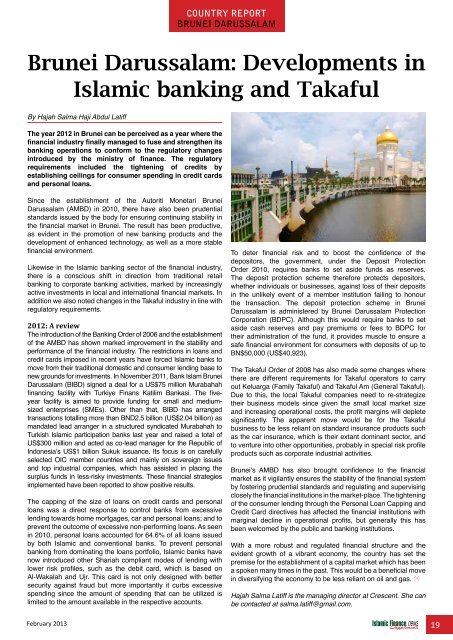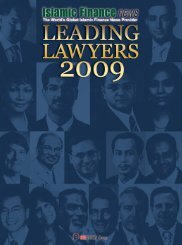View PDF Edition - Islamic Finance News
View PDF Edition - Islamic Finance News
View PDF Edition - Islamic Finance News
Create successful ePaper yourself
Turn your PDF publications into a flip-book with our unique Google optimized e-Paper software.
country report<br />
Brunei Darussalam<br />
Brunei Darussalam: Developments in<br />
<strong>Islamic</strong> banking and Takaful<br />
By Hajah Salma Haji Abdul Latiff<br />
The year 2012 in Brunei can be perceived as a year where the<br />
financial industry finally managed to fuse and strengthen its<br />
banking operations to conform to the regulatory changes<br />
introduced by the ministry of finance. The regulatory<br />
requirements included the tightening of credits by<br />
establishing ceilings for consumer spending in credit cards<br />
and personal loans.<br />
Since the establishment of the Autoriti Monetari Brunei<br />
Darussalam (AMBD) in 2010, there have also been prudential<br />
standards issued by the body for ensuring continuing stability in<br />
the financial market in Brunei. The result has been productive,<br />
as evident in the promotion of new banking products and the<br />
development of enhanced technology, as well as a more stable<br />
financial environment.<br />
Likewise in the <strong>Islamic</strong> banking sector of the financial industry,<br />
there is a conscious shift in direction from traditional retail<br />
banking to corporate banking activities, marked by increasingly<br />
active investments in local and international financial markets. In<br />
addition we also noted changes in the Takaful industry in line with<br />
regulatory requirements.<br />
2012: A review<br />
The introduction of the Banking Order of 2006 and the establishment<br />
of the AMBD has shown marked improvement in the stability and<br />
performance of the financial industry. The restrictions in loans and<br />
credit cards imposed in recent years have forced <strong>Islamic</strong> banks to<br />
move from their traditional domestic and consumer lending base to<br />
new grounds for investments. In November 2011, Bank Islam Brunei<br />
Darussalam (BIBD) signed a deal for a US$75 million Murabahah<br />
financing facility with Turkiye Finans Katilim Bankasi. The fiveyear<br />
facility is aimed to provide funding for small and mediumsized<br />
enterprises (SMEs). Other than that, BIBD has arranged<br />
transactions totalling more than BND2.5 billion (US$2.04 billion) as<br />
mandated lead arranger in a structured syndicated Murabahah to<br />
Turkish <strong>Islamic</strong> participation banks last year and raised a total of<br />
US$300 million and acted as co-lead manager for the Republic of<br />
Indonesia’s US$1 billion Sukuk issuance. Its focus is on carefully<br />
selected OIC member countries and mainly on sovereign issues<br />
and top industrial companies, which has assisted in placing the<br />
surplus funds in less-risky investments. These financial strategies<br />
implemented have been reported to show positive results.<br />
The capping of the size of loans on credit cards and personal<br />
loans was a direct response to control banks from excessive<br />
lending towards home mortgages, car and personal loans; and to<br />
prevent the outcome of excessive non-performing loans. As seen<br />
in 2010, personal loans accounted for 64.6% of all loans issued<br />
by both <strong>Islamic</strong> and conventional banks. To prevent personal<br />
banking from dominating the loans portfolio, <strong>Islamic</strong> banks have<br />
now introduced other Shariah compliant modes of lending with<br />
lower risk profiles, such as the debit card, which is based on<br />
Al-Wakalah and Ujr. This card is not only designed with better<br />
security against fraud but more importantly it curbs excessive<br />
spending since the amount of spending that can be utilized is<br />
limited to the amount available in the respective accounts.<br />
To deter financial risk and to boost the confidence of the<br />
depositors, the government, under the Deposit Protection<br />
Order 2010, requires banks to set aside funds as reserves.<br />
The deposit protection scheme therefore protects depositors,<br />
whether individuals or businesses, against loss of their deposits<br />
in the unlikely event of a member institution failing to honour<br />
the transaction. The deposit protection scheme in Brunei<br />
Darussalam is administered by Brunei Darussalam Protection<br />
Corporation (BDPC). Although this would require banks to set<br />
aside cash reserves and pay premiums or fees to BDPC for<br />
their administration of the fund, it provides muscle to ensure a<br />
safe financial environment for consumers with deposits of up to<br />
BN$50,000 (US$40,923).<br />
The Takaful Order of 2008 has also made some changes where<br />
there are different requirements for Takaful operators to carry<br />
out Keluarga (Family Takaful) and Takaful Am (General Takaful).<br />
Due to this, the local Takaful companies need to re-strategize<br />
their business models since given the small local market size<br />
and increasing operational costs, the profit margins will deplete<br />
significantly. The apparent move would be for the Takaful<br />
business to be less reliant on standard insurance products such<br />
as the car insurance, which is their extant dominant sector, and<br />
to venture into other opportunities, probably in special risk profile<br />
products such as corporate industrial activities.<br />
Brunei’s AMBD has also brought confidence to the financial<br />
market as it vigilantly ensures the stability of the financial system<br />
by fostering prudential standards and regulating and supervising<br />
closely the financial institutions in the market-place. The tightening<br />
of the consumer lending through the Personal Loan Capping and<br />
Credit Card directives has affected the financial institutions with<br />
marginal decline in operational profits, but generally this has<br />
been welcomed by the public and banking institutions.<br />
With a more robust and regulated financial structure and the<br />
evident growth of a vibrant economy, the country has set the<br />
premise for the establishment of a capital market which has been<br />
a spoken many times in the past. This would be a beneficial move<br />
consulting www.<strong>Islamic</strong><strong>Finance</strong>Consulting.com<br />
www.<strong>Islamic</strong><strong>Finance</strong>Events.com<br />
in diversifying the economy to be less reliant on oil and gas.<br />
www.<strong>Islamic</strong><strong>Finance</strong><strong>News</strong>.com<br />
www.<strong>Islamic</strong><strong>Finance</strong>Training.com<br />
www.MIFforum.com<br />
www.MIFmonthly.com<br />
www.MIFtraining.com<br />
www.REDmoneyBooks.com<br />
Hajah Salma Latiff is the managing director at Crescent. She can<br />
be contacted at salma.latiff@gmail.com.<br />
February 2013 19
















